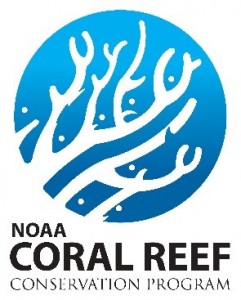NSU Newsroom
SharkBytes
Horizons
This version of NSU News has been archived as of February 28, 2019. To search through archived articles, visit nova.edu/search. To access the new version of NSU News, visit news.nova.edu.
This version of SharkBytes has been archived as of February 28, 2019. To search through archived articles, visit nova.edu/search. To access the new version of SharkBytes, visit sharkbytes.nova.edu.
NSU Continues to Oversee National Coral Reef Management Fellowship Program
We’re Looking for a Few Good Men and Women – Seven, to be Exact – for a 2-Year Assignment
It is incontrovertible – the world’s coral reefs are under attack.
The evidence is clear that there are several “stressors” – increasing ocean temperatures, pollution and disease, not to mention the occasional oil spill or ship grounding – that play a role in the declining health of our reefs.
Protecting the world’s coral reefs has been at the forefront of research for researchers and students at Nova Southeastern University’s (NSU) Halmos College of Natural Sciences and Oceanography. Recognized as a world leader, NSU has been researching coral reefs as way to not only understand these unique animals, but to also help provide information for better protection and conservation of our reefs.
 To that end, NSU will once again oversee the National Coral Reef Management Fellowship Program. This program is a partnership between NSU, the National Oceanic and Atmospheric Administration’s (NOAA) Coral Reef Conservation Program, the Department of the Interior Office of Insular Affairs and the U.S. All Islands Coral Reef Committee. This program provides seven, 2-year positions that strive to address both current capacity gaps, as well as to build longer-term capacity in the identified jurisdictions by placing highly qualified individuals whose education and work experience meet each jurisdiction’s specific coral reef management needs. The vision for the program is to develop a thriving collaborative fellowship program that builds excellent next generation leaders and capacity for effective local coral reef ecosystem management.
To that end, NSU will once again oversee the National Coral Reef Management Fellowship Program. This program is a partnership between NSU, the National Oceanic and Atmospheric Administration’s (NOAA) Coral Reef Conservation Program, the Department of the Interior Office of Insular Affairs and the U.S. All Islands Coral Reef Committee. This program provides seven, 2-year positions that strive to address both current capacity gaps, as well as to build longer-term capacity in the identified jurisdictions by placing highly qualified individuals whose education and work experience meet each jurisdiction’s specific coral reef management needs. The vision for the program is to develop a thriving collaborative fellowship program that builds excellent next generation leaders and capacity for effective local coral reef ecosystem management.
“This fellowship offered all the opportunities, challenges, exposure and professional growth I hoped for,” said Hilary Lohmann, National Reef Management Fellow for the U.S. Virgin Islands. “I chose this fellowship because it is founded in management; the stuff for which you roll up your sleeves, you hustle, and you learn through experience and observation. I work with local and federal agencies, as well as a number of nonprofits. My goal is to work for a group that navigates the spaces between and amongst these structurally different, but mission-sharing, agencies and organizations throughout the Caribbean. This fellowship truly, thoroughly complements my previous academic, research, and work experience. I am grateful for the opportunity, which already has set the stage for further Caribbean work in human dimensions of marine protected areas.”
The seven jurisdictions where these fellows will be placed include: Florida, Hawaii, American Samoa, Guam, Puerto Rico, the U.S. Virgin Islands, and the Commonwealth of the Northern Mariana Islands. The program is currently accepting applications for those interested in being a fellow.
Requirements are individuals have a bachelor’s or master’s degree in marine sciences, environmental sciences or a related field and some professional experience related to their educational history – specifics vary depending on the jurisdiction in question.
Those interested in applying can do so ONLINE (http://cnso.nova.edu/fellows/apply.html).
The program responds to the need for increased coral reef management capacity in the coral reef jurisdictions while providing an opportunity to gain professional experience, expertise, and understanding of coral reef resources and management at the jurisdictional level. Fellows can be expected to work on national goals for climate change, land-based sources of pollution and fishing, as well as addressing local needs such as the development of management plans for marine managed areas, increased community involvement in monitoring and response, climate change adaptation, and biological monitoring.
The idea behind this collaboration is strengthening local coral reef management capacity by:
- Providing a mechanism to generate high quality professionals that help fill the jurisdictions’ capacity needs in coral reef management;
- Providing on the ground experience in the fields of coral reef science and management, at the local level, that will help to hone the fellows’ understanding and professional skill set for working on coral reef ecosystems and resources;
- Equipping fellows with experience to guide next steps in pursuing a career working on coral reef issues; and,
- Providing opportunities to interact and connect with government agencies and partners working on coral reef ecosystem and related resource management in the local jurisdiction.
